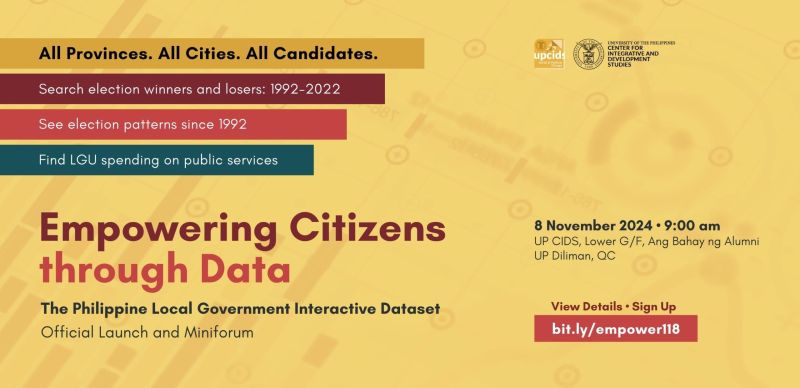Empowering Democracy: UP CIDS Launches Interactive Data Dashboard for 2025 Elections

The Program on Social and Political Change (PSPC) of the UP Center for Integrative and Development Studies (CIDS) recently unveiled the Philippine Local Government Interactive Dataset Website, a beta platform designed to enhance transparency and accountability in local governance. Launched during a public event on 8 November 2024, the website offers a crucial resource for data-driven insights with the 2025 midterm elections in mind.
The launch of the Philippine Local Government Interactive Dataset Website marks the culmination of months of rigorous research, stakeholder consultations, and a commitment to evidence-based governance. This innovative platform, spearheaded by Dr. Rogelio Alicor Panao, PSPC Convenor and lead researcher, provides a centralized and user-friendly interface consolidating decades of electoral and fiscal data.
“The ultimate goal is to encourage informed decision-making, foster accountability, and enhance public understanding of effective leadership at the local level,” Dr. Panao said.
The website features a comprehensive dashboard integrating data from various sources, including the Commission on Elections (COMELEC) and the Bureau of Local Government Finance (BLGF). Building upon Dr. Panao’s 2020 study on the impact of fiscal transfers on local revenue generation, the project now encompasses a comprehensive dataset of electoral outcomes and fiscal information spanning from 1992 to 2022.
A distinguished panel of experts, including Philippine Political Science Association (PPSA) President Prof. Jan Robert Go, WRNumero President and CEO Prof. Cleve V. Arguelles, and OCTA Research Inc. Founder Prof. Ranjit Rye, led the discussion on the complexities and opportunities of data-driven approaches to electoral analysis and governance assessment. Prof. Go emphasized the importance of integrity in political research, while Prof. Arguelles highlighted innovative methodologies for analyzing electoral patterns. Prof. Rye, drawing from his extensive experience, underscored the role of data analytics in informing public policy.
Representatives from COMELEC, as well as students from various universities and organizations such as NAMFREL and the Asia Foundation, also attended the launch. Dr. Panao stressed the importance of collaboration: “This is not something we can do alone. We need the support of stakeholders from all sectors…to make this platform a powerful tool for change.”
The dashboard has the potential to transform civic engagement by empowering citizens to ask critical questions about their leaders and their performance. “By making this data accessible, we hope to encourage retrospective voting—where voters evaluate candidates based on their track record, accountability, and governance outcomes,” Dr. Panao explained.
Designed with accessibility in mind, the platform offers a straightforward interface available in Filipino, enabling citizens to explore a wide range of data, from electoral outcomes to fiscal management records. This aligns with UP CIDS PSPC’s mission to foster civic engagement and informed discussions on governance.
Despite the challenges in compiling and standardizing data from fragmented and inconsistent sources, the PSPC team is committed to refining and expanding the dashboard. As a work-in-progress, the platform will continue to evolve with the incorporation of additional datasets and features. The team actively seeks stakeholder feedback to ensure the dashboard’s responsiveness to user needs.
The dashboard’s launch is timely as the Philippines prepares for the 2025 elections. This platform provides voters with a powerful tool for informed decision-making, promoting transparency and accountability, and potentially reshaping the political landscape through a more data-driven approach to governance.
Furthermore, PSPC announced a Call for Papers inviting researchers and scholars to contribute to the discourse on governance and electoral processes. Detailed information and submission guidelines will be available on the UP CIDS website. Submissions will open in January 2025.